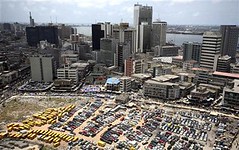
An aerial view shows the central business district in Nigeria's commercial capital of Lagos, April 7, 2009. REUTERS/Akintunde Akinleye
Originally uploaded by Pan-African News Wire File Photos
An aerial view shows the central business district in Nigeria's
commercial capital of Lagos
By Chijioke Ohuocha
LAGOS (Reuters) - Most of the Nigerian banks rescued in a $4 billion
bailout last year may show they have returned to profit in the first
quarter but the figures are illusory as they have not had any
underlying growth, analysts said.
Afribank, Finbank, Oceanic Bank, Spring Bank, Union Bank and Wema Bank are among the banks to have swung back to profit months after deep losses and huge writedowns.
The central bank wants new investors to recapitalise the nine
institutions it rescued and Governor Lamido Sanusi told Reuters this
month that a number of foreign banks and private equity investors were still interested.
However, the underlying business of Nigeria's banks has improved
little since the bailout. Growth in bank credit to the private sector
was still stuck at 0.35 percent in the first quarter compared to 25
percent growth in the same period of 2008.
Analysts have said the rescued banks' first-quarter profits are due to
last year's high levels of provisioning rather than growth in lending,
which has been reflected in the fact the results have failed to lift
stock prices in the banking sector.
"I don't think what we've seen from the first quarter is a result of
their direct intermediation or improvement in their core business. The
results represent some recoveries and provisions no longer required," said Anthony Orororo, head of research at Lagos-based Future View Financial Services.
"The results have failed to lift market sentiment. I don't see any of
these rescued banks delivering 10 to 15 percent upside (returns)
between now and the third quarter," he said.
The nine rescued banks made provisions for loan losses totalling more than 2.2 trillion naira after the bailout last August and October,
wiping out their shareholders' funds and throwing them deep into the
red.
Two senior bankers, who asked not to be named, said the profits could be explained by the "big bath" accounting technique, in which firms write off massive amounts of certain assets from their balance sheets in a single year and show increased future net income.
"The rescued banks were forced to provide massively for every loan
they had and the ones they were not sure of... This is the big bath
technique, you take a big hit last year and this year any loan
recovery is a profit," one of the bankers said.
STOCK RALLY FALTERS
Concerns over the slow pace at which the underlying health of
Nigeria's financial sector is improving has caused a rally on the
stock market to falter.
Banks account for 60 percent of market capitalisation and the index
has retreated to three-month lows in the wake of the banks' first
quarter results, although it is still up more than 20 percent since
the start of the year.
Analysts had predicted a 40 percent rally over the year as a whole,
driven by the quick resolution of banking reforms.
But progress has been slower than anticipated.
The creation of an asset management company (AMCON) to soak up
non-performing loans and get banks lending again has taken longer than hoped. Parliament has passed a bill to form AMCON has been passed by parliament but is still awaiting presidential approval.
Ratings agency Standard & Poor's said on Monday Nigeria's banking
system remained "very high risk", with banks in the single B category,
and there was "still a long way to go" with regulatory reforms.
The central bank said on Monday it was granting a three-month
extension to a recapitalisation deadline for two banks, Unity and
Wema, because of delays to the formation of AMCON.
Central bank auditors last year determined Unity Bank had insufficient capital but it was not one of the nine banks to receive a capital injection because it was deemed to have a healthy liquidity position.
2010-06-30 14:23:34
No comments:
Post a Comment